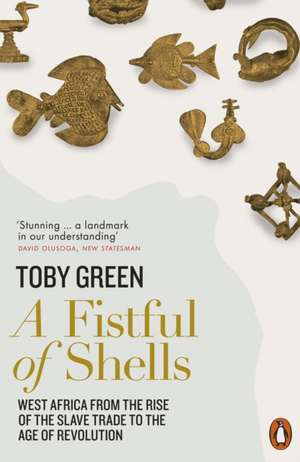A Fistful of Shells: West Africa from the Rise of the Slave Trade to the Age of Revolution
Autor Toby Greenen Limba Engleză Paperback – 29 ian 2020
Winner of the Historical Writers' Association Non-Fiction Crown 2020
Winner of the American Historical Association's Jerry Bentley Prize in World History 2020
Winner of the Nayef Al-Rodhan Prize for Global Cultural Understanding 2019
AnObserverandWall Street JournalBook of the Year 2019
A groundbreaking history that will transform our view of West Africa
By the time of the 'Scramble for Africa' in the late nineteenth century, Africa had already been globally connected for many centuries. Its gold had fuelled the economies of Europe and Islamic world since around 1000, and its sophisticated kingdoms had traded with Europeans along the coasts from Senegal down to Angola since the fifteenth century. Until at least 1650, this was a trade of equals, using a variety of currencies - most importantly shells: the cowrie shells imported from the Maldives, and the nzimbu shells imported from Brazil.
Toby Green's groundbreaking new book transforms our view of West and West-Central Africa. It reconstructs the world of kingdoms whose existence (like those of Europe) revolved around warfare, taxation, trade, diplomacy, complex religious beliefs, royal display and extravagance, and the production of art.
Over time, the relationship between Africa and Europe revolved ever more around the trade in slaves, damaging Africa's relative political and economic power as the terms of monetary exchange shifted drastically in Europe's favour. In spite of these growing capital imbalances, longstanding contacts ensured remarkable connections between the Age of Revolution in Europe and America and the birth of a revolutionary nineteenth century in Africa.
A Fistful of Shellsdraws not just on written histories, but on archival research in nine countries, on art, praise-singers, oral history, archaeology, letters, and the author's personal experience to create a new perspective on the history of one of the world's most important regions.
'Astonishing, staggering' Ben Okri,Daily Telegraph
| Toate formatele și edițiile | Preț | Express |
|---|---|---|
| Paperback (2) | 82.19 lei 24-30 zile | +32.71 lei 4-10 zile |
| Penguin Books – 29 ian 2020 | 82.19 lei 24-30 zile | +32.71 lei 4-10 zile |
| University of Chicago Press – 5 mar 2021 | 164.57 lei 3-5 săpt. |
Preț: 82.19 lei
Preț vechi: 96.57 lei
-15% Nou
Puncte Express: 123
Preț estimativ în valută:
15.73€ • 17.09$ • 13.22£
15.73€ • 17.09$ • 13.22£
Carte disponibilă
Livrare economică 03-09 aprilie
Livrare express 14-20 martie pentru 42.70 lei
Preluare comenzi: 021 569.72.76
Specificații
ISBN-13: 9780141977669
ISBN-10: 0141977663
Pagini: 656
Dimensiuni: 129 x 198 x 27 mm
Greutate: 0.45 kg
Editura: Penguin Books
Colecția Penguin
Locul publicării:London, United Kingdom
ISBN-10: 0141977663
Pagini: 656
Dimensiuni: 129 x 198 x 27 mm
Greutate: 0.45 kg
Editura: Penguin Books
Colecția Penguin
Locul publicării:London, United Kingdom
Notă biografică
Toby
Greenhas
worked
widely
with
academics,
musicians
and
writers
across
Africa,
organising
events
in
collaboration
with
institutions
in
Angola,
Ghana,
Guinea-Bissau,
Mozambique
Sierra
Leone
and
the
Gambia.
He
has
written
a
number
of
previous
books,
and
his
work
has
been
translated
into
twelve
languages.
Awarded
a
2017
Philip
Leverhulme
Prize
in
History,
he
is
Senior
Lecturer
in
Lusophone
African
History
and
Culture
at
King's
College
London.
His
2019
bookA
Fistful
of
Shellswon
the
Nayef
Al-Rodhan
Prize
for
global
cultural
understanding
and
was
shortlisted
for
the
Cundill
History
Prize
and
the
inaugural
Pius
Adesanmi
Memorial
Award.
Recenzii
A
Fistful
of
Shellsis
the
fruit
of
research
conducted
in
the
archives
of
nine
nations
and
required
the
author
to
undertake
fieldwork
across
eight
West
African
states.
It
shows.
[...]
This
is
a
stunning
work
of
research
and
argumentation.
It
has
the
potential
to
become
a
landmark
in
our
understanding
of
the
most
misunderstood
of
continents.
Toby Green'sA Fistful of Shellsuses a global archive - in Africa, the Americas and Europe - to explore the complex, flourishing and connected economy of West Africa existing long before a European capitalist system established itself on the continent. Extraordinarily written and researched, the book paints a huge, complex canvas, filled with individual detail.
A multifaceted history of West Africa which turns many old assumptions on their heads. Green utterly demolishes the tired Western view that Africa had no history before the arrival of the Europeans, and that they naively ceded power in the region to the newcomers by exchanging valuable goods for baubles. A magisterial, extensive and fresh account of the history of West Africa that rewrites the region and its peoples back into World History, where they belong.
Toby Green's book restores the rich African history which she had been denied for too long. Here the author reveals that Africa was never at the margins of global commerce but was in fact a decisive player with the prowess to negotiate and also the goods - ivory, gum, gold - to supply.
Toby Green's transformative book repositions West African history in an entirely new light. It brings into focus the region's fundamental place in shaping the modern world as well as the powerful and also difficult legacy of this today.
Very seldom do I pick up a history book and wish I had written it myself. Toby Green'sA Fistful of Shellsis one such book. Brilliantly conceptualized, beautifully written, it breaks with colonially configured regional boundaries - which work to re-create unintended silos of knowledge - to imagine a West and West Central African Atlantic history of money, power, religion, and inequality that is as rich as it is sound.
A Fistful of Shellsis exemplary: scholarly, sensitive, enlightening and often vivid. The author does much more than make Africa seem normal. He proclaims a daunting ambition: to explore the local and global implications of West Africa's economies during the age of slavery. He succeeds.
Toby Green'sA Fistful of Shellsuses a global archive - in Africa, the Americas and Europe - to explore the complex, flourishing and connected economy of West Africa existing long before a European capitalist system established itself on the continent. Extraordinarily written and researched, the book paints a huge, complex canvas, filled with individual detail.
A multifaceted history of West Africa which turns many old assumptions on their heads. Green utterly demolishes the tired Western view that Africa had no history before the arrival of the Europeans, and that they naively ceded power in the region to the newcomers by exchanging valuable goods for baubles. A magisterial, extensive and fresh account of the history of West Africa that rewrites the region and its peoples back into World History, where they belong.
Toby Green's book restores the rich African history which she had been denied for too long. Here the author reveals that Africa was never at the margins of global commerce but was in fact a decisive player with the prowess to negotiate and also the goods - ivory, gum, gold - to supply.
Toby Green's transformative book repositions West African history in an entirely new light. It brings into focus the region's fundamental place in shaping the modern world as well as the powerful and also difficult legacy of this today.
Very seldom do I pick up a history book and wish I had written it myself. Toby Green'sA Fistful of Shellsis one such book. Brilliantly conceptualized, beautifully written, it breaks with colonially configured regional boundaries - which work to re-create unintended silos of knowledge - to imagine a West and West Central African Atlantic history of money, power, religion, and inequality that is as rich as it is sound.
A Fistful of Shellsis exemplary: scholarly, sensitive, enlightening and often vivid. The author does much more than make Africa seem normal. He proclaims a daunting ambition: to explore the local and global implications of West Africa's economies during the age of slavery. He succeeds.
Cuprins
List of Maps
Foreword
Note on Spellings/Names
Glossary
Introduction
Part One
Causes: Economic Divergence in West and West- Central Africa
Timelines for Part One
1 ‘Three Measures of Gold’: The Rise and Fall of the Great Empires of the Sahel
2 Causeways across the Savannah: From Senegambia to Sierra Leone
3 Ready Money: The Gold Coast and the Gold Trade
4 Rivers of Cloth, Masks of Bronze: The Bights of Benin and Biafra
5 The Kingdom of Kongo: From Majesty to Revolt
Coda to Part One
Part Two
Consequences: Politics, Belief and Revolutions from Below
Timeline for Part Two: West African Political History, c. 1680–1850
Prologue to Part Two
6 ‘With Boots Worth 3 Slaves’: Slavery and Value in the Eighteenth Century
7 On a War Footing: The ‘Fiscal- Military State’ in West African Politics
8 Feeding Power: New Societies, New Worldviews
9 Transnational Africas, Struggle and the Rising of Modernity
10 Warrior Aristocracies and Pushback from Below
11 Let them Drink Rum! Islam, Revolution and the Aristocracy
Conclusion
Bibliography
Notes
List of Illustrations
Index
Foreword
Note on Spellings/Names
Glossary
Introduction
Part One
Causes: Economic Divergence in West and West- Central Africa
Timelines for Part One
1 ‘Three Measures of Gold’: The Rise and Fall of the Great Empires of the Sahel
2 Causeways across the Savannah: From Senegambia to Sierra Leone
3 Ready Money: The Gold Coast and the Gold Trade
4 Rivers of Cloth, Masks of Bronze: The Bights of Benin and Biafra
5 The Kingdom of Kongo: From Majesty to Revolt
Coda to Part One
Part Two
Consequences: Politics, Belief and Revolutions from Below
Timeline for Part Two: West African Political History, c. 1680–1850
Prologue to Part Two
6 ‘With Boots Worth 3 Slaves’: Slavery and Value in the Eighteenth Century
7 On a War Footing: The ‘Fiscal- Military State’ in West African Politics
8 Feeding Power: New Societies, New Worldviews
9 Transnational Africas, Struggle and the Rising of Modernity
10 Warrior Aristocracies and Pushback from Below
11 Let them Drink Rum! Islam, Revolution and the Aristocracy
Conclusion
Bibliography
Notes
List of Illustrations
Index



